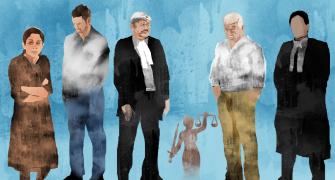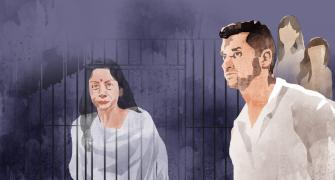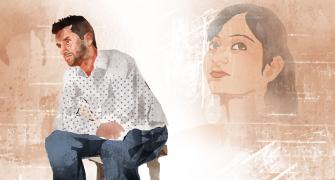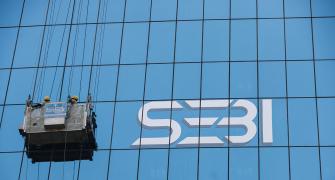A yellow-sari daintily clad Indrani was beaming broadly and it seemed like for the first time, for her, Rahul had done something right.
Vaihayasi Pande Daniel reports from the Sheena Bora Murder Trial.
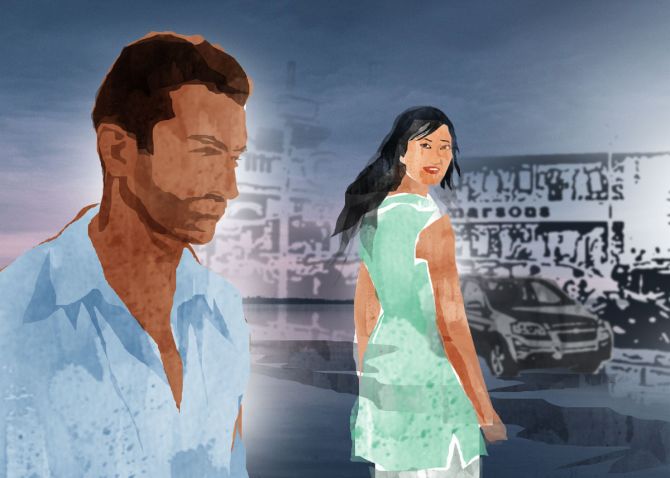
The last few headlines one viewed, before losing phone network signal, and climbing the three flights of stairs to Courtroom 51 at the Mumbai city civil and sessions court, Kala Ghoda, south Mumbai, on Saturday November 19, was about Shraddha Walkar's horrific murder in Delhi.
It resonated rather well with where I was headed -- to cover the ongoing trial of another girl murdered, Sheena Bora.
You wondered: Is Rahul Mukerjea watching footage of the Shraddha Walkar murder? Hopefully not.
Every day we are either shown past videos of Aftab Poonawala leaving his home in south Delhi, with a bag of her body parts, or learning about what he googled or watched to figure out how to brazenly commit the crime, or hearing testimonies from Shraddha's friends, or reading about the agony of her father Vikas, as more and more facts of this grim murder are discovered, day by day.
If Rahul is watching any of this, it must have so many anguishing parallels for him.
Of when his beloved girlfriend went missing. Vanished. Suddenly. One day ten years ago. And for three long years he had no answers and we are not sure what kind of answers he actually has today either.
The uncovering of the details of Shraddha's killing are occurring right now and has grabbed national attention and disturbed India's collective conscience.
The utterly cruel circumstances surrounding the Walkar murder remind us how important it is for Shraddha to get justice.
It should also nudge us, with similar immediacy, to realise how critical it is for the young woman named Sheena to get justice too, even if it will be 10 or 12 years late in its coming.
The last time Rahul saw the lovely-looking Sheena, on the evening of April 24, 2012, she was allegedly walking towards a silver Chevrolet in Bandra, north west Mumbai, outside the Amarsons department store, to meet her mother Indrani Mukerjea, who is/was Rahul's stepmother (Rahul is the son of Peter Mukerjea from his first marriage).
Rahul was in a silver Maruti Alto.
She got into the Chevrolet (although the defence claimed on Thursday, November 17, 2022 that it was actually a black Opel Astra) and then turned his car around to head back to their home further north in Andheri East, also north west Mumbai, eventually.
The defence's cross examination of Rahul Mukerjea last week, including on Saturday, November 19, in the Sheena Bora murder trial did a flashback/rewind of the events in the days that followed, days which would have been terribly painful for Rahul.
Rahul received a message from Sheena's phone, not necessarily Sheena, that evening, after he dropped her to Bandra, that she planned to spend the night with her mother at Indrani's home at 18, Marlow, Worli, south central Mumbai, and return early the next day.
The following morning Sheena never returned, nor did he hear from her. And Rahul started to get worried, perhaps because the mother-daughter relationship (Sheena was Indrani's first born from another relationship) was always a fraught one.
He made a round of calls, that continued for many days, mainly to Indrani, which he recorded.
Indrani's advocate Ranjeet Vishnupant Sangle queried Rahul about those calls in court Saturday.
Sangle: "Rahul, in your statement given to the learned magistrate (in the first part of the judicial process) you had told her that you had spoken to Indrani for one week after April 25-26 (2012)?"
Rahul: "Yes."
Sangle: "Rahul, I put it to you, that you don't remember the exact dates of the audio recordings that you made."
Rahul: "That is correct."
Later in the cross Rahul agreed that he would have spoken to Indrani probably on April 25, 26 and 27.
Prior to that Sangle wanted to know why Indrani's Call Data Records (CDRs) when shown to him by the Khar police, the first investigators, and the CBI, who took over the investigation, showed that there hadn't been any calls to Indrani.
Sangle forcefully, his voice louder than its usual court decibels: "There is not one single call made to Indrani!"
Rahul swiftly parried that saying he would call his father and then "they would both speak to me on a speaker phone" and since he was uncertain/suspicious of what was going on he recorded the conversations.
Sangle disagreed and instead charged: "Rahul, I put it to you, that you have, with a completely ulterior motive, (been) falsely implicating Indrani in this case and have consistently lied and stated falsely to the investigationg agency, the Khar police, to the magistrate and to the CBI."
Rahul evenly: "No that's not true. I have no reason to falsely implicate anyone."
Sangle asked Rahul about the Maruti Alto car he abandoned at Mumbai airport.
It wasn't clear through the cross when exactly Rahul dumped this vehicle. But evidently after looking for Sheena for many days, a distraught Rahul gave up and probably headed for his mother's house in Dehradun and left the car in Mumbai.
The line of questioning in the cross unraveled this way:
Sangle: "Isn't it correct that when you abandoned the Maruti Alto at Mumbai airport a bomb detection squad had to come to inspect it?"
Rahul, stonily: "I don't know."
Sangle, reprimandingly: "Isn't it true that after abandoning the car you had never informed Peter or Indrani that you had abandoned it?"
Rahul, still stonily: "I don't know. I don't think so. I hadn't told them. I wasn't talking to them at the time."
Sangle, with an air of reprehension: "Rahul were you aware that they had to pay a heavy penalty and fine to the police to have it released from the airport parking lot (with the help of) the Buddha brothers (Sameer and Sohail)."
Rahul, mildly disinterested: "No, I don't know."
Sangle stated again to Rahul something about the severity of the grievance for Indrani and Peter when he left the car at the airport and about the "penalty and fine" they faced.
One could not second guess the thoughts going through Rahul's head at that moment; his face was impassive.
No doubt he would/should have been weighing their "penalty" with his own far more grievous and heartbreaking one at the time.
Rahul said that after disposing of it at the airport he hadn't seen the car again.
Sangle: "Are you aware that when this car was recovered from the parking lot there were blood stains on all the seats?" and added, "And a pair of earrings and a red cloth was recovered from the car?"
Rahul: "No I wasn't aware", and then said sharply, "That wasn't the state I left it in."
Initially there was a smile of disbelief in his voice when he heard this description of the car. On further contemplation the question bothered Rahul considerably and he politely requested the judge twice, once again towards the end of the proceedings, if it could be put on record that the car had not been left in the parking lot in "that state".
Sangle, with a big smile: "It's my cross examination. He cannot tell stories there!" Special CBI Prosecutor Manoj Chaladan assured Rahul he would get a chance to record that later.
For the umpteenth time in this trial, the names of the Buddha brothers were trotted out on Saturday.
Like Waldo (in the Where's Waldo series) they invariably come sauntering in, into some far corner of the picture. Their names came up four or five times Saturday.
... Sameer Buddha was helping Sheena get a new laptop, Blackberry and dongle and when the first investigators the Khar police recovered the CDRs (call data records) from her phone there were two calls with Sameer...
... "Rahul, you have heard of this name Sameer Buddha before?"
... The Buddha brothers helped the Mukerjeas solve the Maruti Alto airport matter...
... The Buddhas had some connection with then Mumbai police commissioner Rakesh Maria.
Six years into the trial, one can only vaguely guess what shadowy role the Buddhas might have had in the intricacies of these case.
Sangle at the October 4 hearing alleged that former policeman Sohail Buddha paid the police Rs 10 lakh (Rs 1 million) to ensure an FIR was not registered against Rahul when he had a 'minor' motorcycle accident.
Sangle cut to August 2015 and the statements Rahul gave to the Khar police after the arrest of Indrani Mukerjea on August 25, 2015.
He established exactly who interrogated Rahul, what electronic records of his and Sheena's had been made available, the questioning modus operandi, who wrote Rahul's statement down.
Via rapid-fire questions, Sangle quizzed Rahul about the Khar police officers he dealt with.
Sangle: "Were you aware that Sohail Buddha had worked with police officer Rakesh Maria for the detection of several big cases in Mumbai and Maharashtra?"
"Have you heard the name Rakesh Maria? Was he one of the police officers who interrogated you?"
"Were you aware he was leading the investigation because he was the police commissioner at the time?"
"Do you remember Dinesh Kadam being there? Do you remember the names of the other officers?"
Rahul said he wasn't aware of what police do or don't do and didn't know who was leading what.
He said Maria had questioned him, but not taken a statement, while a "Mr (Nitin) Alaknure had and that Mr Deven Bharti was also present while taking my statement."
The advocate pondered if Rahul had told anyone in the police about his forged marriage certificate and forged letter of employment (reference October 4 article on the Sheena Bora murder trial).
Rahul said he had given everything over to the police and they had access and it was not a matter of not wanting to give these bits of information.
Towards the end of the day's cross, the focus crucially shifted to a Mr Kishore Bardhan who worked at Sheena's grandparents house in Guwahati.
In the process of doing his own investigation into what happened to Sheena, Rahul had called up Bardhan in Assam and recorded the conversation he had with him.
Sangle chose to zoom in on a tiny snippet of this chat which was conducted in Hindi.
Before doing so, the lawyer first laid the groundwork. He checked if Rahul understood Hindi.
Rahul confessed he had a working grasp which was getting better and better.
Sangle verified if at any point, while making these audio recordings, Rahul might have said anything falsely, deliberately or otherwise, about the case to the subjects of his recordings or Kishore. Rahul said no.
In the fragment, it seems Rahul is telling Bardhan he is looking for Sheena and mentions that she had last been seen with Indrani at Amarsons Bandra.
Rahul explained to the court: "It was a few days after Sheena disappeared and I was still looking for her."
Kishore asks who else was there too that day and the snippet ran like this:
Kishore: 'Achcha. Woh dono ke sivay aur koiee nahin tha? (Okay. There was nobody there except those two?)'
Rahul: 'Hmm?'
Kishore: 'Aur dusra koiee nahin tha? Aur dusra koiee nahin tha, teesra koiee nahin tha aur? (And no second person was there? And no second or third person was there?)'
Rahul: 'Nahin, nahin. Bas woh doh tha. Actually mujhe maloom nahin actually, lekin... (No, no. Just those two. Actually, I don't know actually. But...)'
Rahul confirmed clearly that he had this chat with Kishore and that the transcript was correct and that "that time I didn't know where Sheena was" and he was referring to Indrani and Sheena because "I would not have mentioned the driver sitting there."
When Rahul admitted that the conversation had happened just as the transcript said and it was true, all three accused in the witness box behind, in Courtroom 51 looked suddenly both happy and very relieved.
A yellow-sari daintily clad Indrani was beaming broadly and it seemed like for the first time, for her, Rahul had done something right.
Indrani always radiates large smiles and laughs from the accused box, but Saturday they were markedly high-wattage.
This snippet, as innocuous as it was, pits one prosecution witness's account against another, because driver Shyamvar Rai's version of that evening's events was quite, quite, quite, different. Hence the wide smiles.
The cross was concluded for Saturday at nearly six and the judge in a very kindly, hospitable, manner told Rahul gently, "Stay for a little while."
Special CBI Judge S P Naik-Nimbalkar is very particular that witnesses should examinee their statements in court at the end of a day's proceedings.
Rahul sat with Chaladan and painstakingly went through the transcript of the Saturday cross for any inadvertent errors, while across the table Sangle was doing the same.
It was a happy party of accused who departed court Saturday. Peter with Sanjeev Khanna and his long-time friend Bala to have coffee and Indrani alone but contented.
Below in the court quadrangle a large group of 15-20 family members, friends, children too, were there to see off a boy of about 25-28 named Zaki Takla. He was going back to prison and had been arrested just 10 days before in a murder case and was in judicial custody.
It was a touching tableau. Lots of anxiety for whether he had enough food, water and more.
Rounds and rounds of hugging as they couldn't bear to be parted.
A few stray tears and quavering voices, but mostly brave faces.
The children -- one wonders what they thought it was about -- full of excitement jumped up and down to make sure they got the last wave.
Some 30 hands waved and blew kisses till he went out of sight. Someone was the mother. And someone very pretty and elegant was the wife.
The rest were brothers, sisters, cousins, nieces, nephews and dost.
It was not hard to tell that it was a recent arrest. There was none of that resigned sorrow one sees writ large on the haunted faces of relatives seeing off those who have been in jail for far longer periods.
There was hope instead.
That's the emotion underlying justice.
Justice is about hope for succour for either the incorrectly accused or the ones wronged. Hope for the righting of wrongs.
Those still mourning Sheena can one day hope for the same. For Shraddha too.
- MUST READ: THE SHEENA BORA MURDER TRIAL
Feature Presentation: Rajesh Alva/Rediff.com

